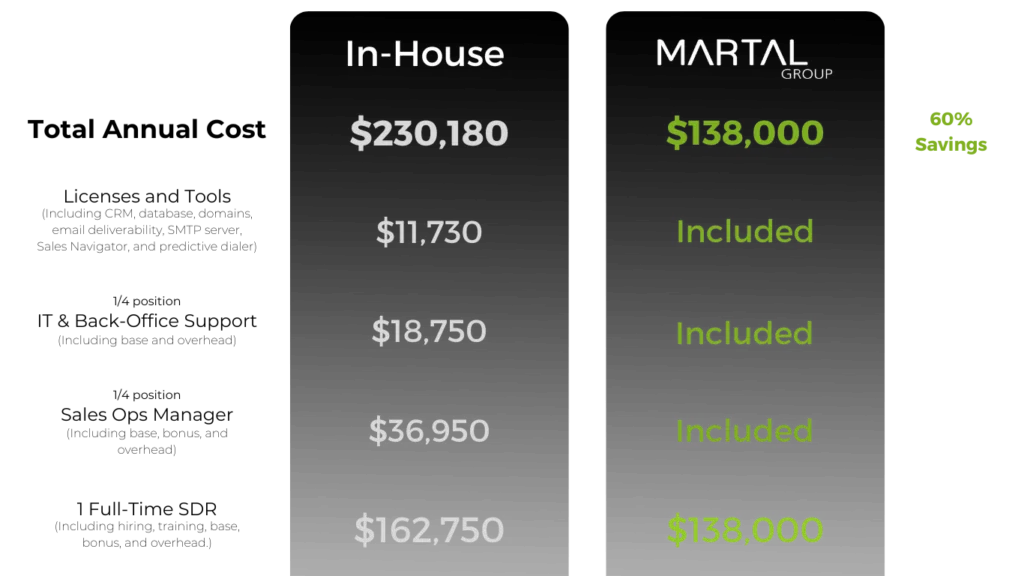How to Outsource Sales: Costs, ROI & AI SDRs [2025]
Major Takeaways: Sales Outsourcing
What is sales outsourcing and why use it?
- Hiring an external team to run prospecting, qualification, appointment setting, or parts of the sales funnel to create predictable pipeline faster.
How does modern sales outsourcing save time for internal teams?
- Outsourced SDRs handle research and outreach so in-house reps focus on closing.
How should companies think about cost and pricing models?
- Retainers (managed SDR), dedicated in-market/US SDRs, pay-per-meeting, or hybrids — choose by risk tolerance and cashflow.
Why is multichannel outreach essential today?
- Integrated email, LinkedIn, and phone cadences increase reply rates and reduce channel risk.
How does AI improve outsourced SDR performance?
- AI adds intent-driven account prioritization, personalized sequencing, and continuous optimization for better meeting quality.
How do outsourced teams improve lead quality?
- Strict qualification, ICP alignment, and AI scoring deliver sales-ready meetings instead of raw leads.
Who benefits most from sales outsourcing?
- Startups needing quick pipeline, SMBs without hiring capacity, and teams expanding into new markets or launching products.
What are the primary risks and how do you mitigate them?
- Poor vendor quality, brand mismatch, hidden costs, and offshore compliance gaps. Mitigate with pilot tests, SLAs, references, live dashboards, and preferring in-market/W-2 SDRs.
What’s the fastest way to validate a partner?
- Run a 30–60 day pilot with clear KPIs, sample cadences, and shared dashboards — then scale if ROI meets targets.
What strategic value do outsourced sales partners add beyond outreach?
- The best partners pair vetted SDRs with AI (intent data, multichannel cadences, real-time analytics) to deliver immediate pipeline and lasting sales capacity.
Introduction
Are you on the hunt for better sales leads?
Working on multiple aspects of your business and handling sales simultaneously is hard. After all, you barely have the time to improve your products, develop new plans for growth, or serve existing customers.
Well…
We have an alternative for you:
Outsourcing sales for your company might be the way to go if you’re struggling to fill your pipeline with qualified leads. In fact, those who outsource sales ramp up their outreach 3x faster and save up to 65 percent a year on expenses, making it a widely popular option for successful B2B companies across all industries.
But what exactly is a sales outsourcing company? What makes outsourced sales services such a popular option for top organizations? And how do I outsource sales for my company?
In this article, we’ll dive deeper into these questions and also unpack:
- The 4 Unrealized Benefits of Sales Outsourcing,
- The 8 Types of Outsourced Sales Companies,
- How to Find the Best Partner in 4 Easy Steps,
- How to Measure the Success of Your Outsourced Sales Team,
- And 4 Tips for Maintaining a Healthy Partnership
You’ll also gain insight into the most common reasons that sales outsourcing fails and how you can avoid the pitfalls.
Without further ado, let’s get to it!
What Is Sales Outsourcing?
Sales outsourcing means hiring an external, specialist team to handle part or all of your lead generation and early sales development (SDR / appointment setting / prospect qualification). For example, a SaaS company may outsource outbound SDR work (prospecting, initial outreach and appointment setting) while keeping contract negotiation and account management in-house
Tasks an outsourced sales team performs can range from prospecting and appointment setting to customer onboarding and account management. It all depends on your company’s needs and the average experience level of the outsourced sales executives.
The Benefits of Outsourcing Your Sales Team
What is it that makes outsourced sales such a captivating option for B2B companies? And why do the most successful organizations outsource sales instead of hiring a full in-house sales team?
One of the most obvious advantages of outsourcing your sales team is time efficiency. It’s a quicker option for any business looking to tap into undiscovered markets or launch new products fast.
Could you imagine: One day, your sales numbers are struggling, and your prospect pool is bone dry, and the next thing you know, your sales pipeline is being filled with fresh leads by highly qualified sales development representatives (SDRs).
How big of an impact would that make on your business?
On top of that, there are a lot of unrealized benefits to outsourced sales solutions if you are new to the concept.
AI-enhanced benefits (why modern sales outsourcing is different)
Better lead prioritization– AI lead scoring reduces wasted follow-up on low-propensity contacts.
Higher intent capture – AI and intent data focus outreach on accounts with buying behavior, raising meeting quality.
Smarter sequencing – ML optimizes touch timing and messaging across channels to boost reply rates.
Faster data-driven optimization– real-time dashboards show what’s working so messaging and targeting improve continuously.
Focus on Core Areas of Your Business
By hiring a team of sales professionals, you can rest assured that your sales process is in good hands. A trusted sales outsourcing agency can help you refine your market research, improve your lead generation, and close more deals quickly.
Martal Group helped Kenneth Kinion, founder of Validin, a data infrastructure and analytics company in Melbourne, Florida. In his review, Kenneth shared:


“We’re an early-stage, highly-focused technical startup, and Martal allows us to develop our business without spending the time, effort, and money on dedicated headcount as we ramp up.”
Founder, Validin, LLC
Read the full review
Like Kenneth and his team, you’ll have all the time you need to focus on essential aspects of your business when you leave the sales and marketing to the pros.
In-House vs Outsourced Sales Development
When deciding between in-house and outsourced sales development, it’s important to weigh the differences in control, cost, scalability, and expertise.
Aspect
In-House Sales Development
Outsourced Sales Development
Control & Alignment
Tighter control over sales processes and direct alignment with company values and culture.
Less direct control; alignment depends on vendor understanding and communication.
Dedicated Focus
Facilitates quicker adjustments to sales strategies based on immediate feedback and market changes.
Focus may be divided across multiple clients, making rapid adjustments harder.
Relationship Building
Encourages development of lasting relationships with customers, boosting loyalty and repeat business.
May lack personal touch, making long-term relationship building more challenging.
Costs
Higher overheads (salaries, benefits, training) can strain the budget.
Typically lower upfront costs; pay-as-you-go models reduce long-term overheads.
Scalability
Scaling up or down quickly is difficult and costly.
Easier to scale quickly to meet demand without long-term commitments.
Expertise
May lack specialized market or technological expertise compared to outsourced teams.
Often brings specialized expertise, industry knowledge, and best practices.
Quick take: In-house teams give control but carry large fixed costs and slower ramp. Outsourced teams (especially those paired with AI-driven platforms) deliver faster pipeline creation, flexible scaling, and lower total operating cost.
What is In-House Sales Development?
In-house sales development refers to the process where sales activities are conducted within the organization by full-time employees. It’s a conventional model that focuses on integrating sales strategies closely with the company’s core operations and culture.
Advantages:
- Control and Alignment: Provides tighter control over sales processes and direct alignment with company values and culture.
- Dedicated Focus: Facilitates quicker adjustments to sales strategies based on immediate feedback and market changes.
- Relationship Building: Encourages the development of lasting relationships with customers, which can lead to increased customer loyalty and repeat business.
Disadvantages:
- Higher Costs: One of the main disadvantages of this model is the significant overheads, including salaries, benefits, and training. These expenses can strain the budget, especially for small to mid-sized companies.
- Scalability Challenges: Scaling the team up or down quickly to meet growth needs is often difficult and can be costly.
- Limited Expertise: Compared to a team of specialized outsourced sales reps, in-house SDRs may lack the specific market or technological expertise crucial for growth. This can limit the effectiveness of sales strategies and innovation.
Supplier Risk: Key Areas to Keep an Eye On
- Quality variance — Low-cost offshore vendors may generate volume but deliver poor fit leads and low conversion.
- Brand & message mismatch — Poorly trained reps can damage buyer perception.
- Data security & compliance risks — Offshore providers may not meet SOC II/GDPR/CCPA requirements.
- Language/cultural friction — Local market nuance matters — misinterpretation reduces meeting quality.
Mitigation: Contractual SLAs, reference checks, in-country SDRs, reporting transparency, and sample campaigns before committing are essential.
What is Outbound Sales Outsourcing?
Outsourced sales development involves hiring external organizations to handle specific sales functions and help you close more deals. Some of the duties you can outsource include lead generation, sales outreach, customer relationship management, and closing deals. For example, a tech company may want to seek expertise from an IT sales outsourcing agency to enhance its market penetration and leverage advanced technological tools.
Advantages:
- Cost Efficiency: Outsourcing sales reps is an excellent option for reducing any overhead costs, such as hiring, benefits, and training in-house staff.
- Flexibility: Unlike recruiting in-house sales reps, outbound sales outsourcing allows for rapid scaling of sales efforts up or down, which is crucial if you need to adapt quickly to market demands.
- Access to Expertise: Hiring the right outsourced sales support team gives you instant access to specialized skills and knowledge, allowing you to implement advanced sales strategies and technologies immediately.
Disadvantages:
- Less Control: Outsourcing your sales team can reduce your control over the sales process and customer interactions if the partner does not share your values and goals. By vetting potential providers carefully, you find an agency that ensures you remain in control while still providing the support you need to optimize your pipeline.
- Dependency: Sometimes, businesses may feel threatened by their reliance on external sales companies. That’s why it’s important to find a partner that prioritizes transparency and collaboration in their processes.
- Cultural Mismatch: Hiring an unreliable sales outsourcing team can lead to misalignment with your company’s culture and values. Partnering with a sales outsourcing agency that has an international presence is the best way to avoid this pitfall.
Gain Access to a Larger Pool of Experienced Sales Reps
Even if you have an experienced, dedicated sales team, working with a third-party partner can bring fresh ideas to the table. There is a lot of great talent and experience to take advantage of by outsourcing your sales functions to an agency.
An outsourced sales company employs sales reps with different experiences, skills, and backgrounds. You can easily reinforce your team with individuals who have extensive experience developing sales plans, pricing products, and promoting similar offers in your industry.
Better yet, these external SDRs are always ready to analyze your sales performance, provide feedback, and test new strategies to boost your bottom line.
When asked what impressed them the most about Martal Group’s sales outsourcing services, Rick Taylor at Forerunner Technologies stated:


“The intelligence of the individual contributors is impressive. What they know about the business isn’t something you’ll find from just anyone.”
EVP of Sales and Marketing
Forerunner Technologies
Read the full review
You’ll be amazed by how effective your company will become at sales development once the outsourced team starts implementing new strategies using cutting-edge technology.
Save More Money on Salaries and Training Costs
There’s a variety of ways you’re going to cut costs and save on your budget if you decide to outsource sales for your company.
For starters:
External hires won’t require any office space or equipment to start working for you. You’ll get a team ready to accelerate your sales cycle as soon as you work out the deal with the agency.
Also:
Third-party SDRs will bring their expertise and skills with them, which means no additional training costs for you. They’ll already know all the sales tools you might need to generate, nurture, and convert your leads.
Most importantly:
A cheaper, inexperienced internal team will actually cost your company more as your lead generation and conversions will both stagnate. So, consider the price of outsourced sales services as a cost of growing your business that will return greater results in the near future.
To help you visualize the savings, we have broken down the annual cost of hiring in-house versus hiring a sales agency like Martal Group. Companies that outsource sales save $92,180 a year, on average.
Want to know how much you would save by outsourcing? Book a call with our experts to obtain a free ROI estimate and outbound sales consultation.

Generate High-Quality Leads
Generating and converting high-quality leads is the top priority for any company that’s serious about increasing sales.
So, let’s face it…
The key differentiator when it comes to in-house vs. outsourced sales development is performance. The option that gets you the most converted leads should win despite all the costs and the time required for implementation.
Fabrizio at DeepHow found that one of the most significant benefits of hiring an external SDR team was the increase in new opportunities, stating:


“Martal Group’s ability to deliver qualified leads consistently has been the most impressive aspect of our partnership.”
VP of Business Development
DeepHow
Read the full review
Your sales partner will guarantee that your company reaches its peak sales performance. They do this by dedicating their time to understanding your ideal customer profiles so they can provide the best buying experience.
Outsourced sales reps will help you conduct market research and identify the right decision-makers based on your business objectives and position in the industry. And they’ll also follow up with all prospects to ensure the highest conversions to fill your pipeline with loyal, long-lasting clients.
Types of Outsourced Sales Services
Having delved into the advantages of outsourcing your sales functions, it’s essential to recognize that not all outsourced sales services are created equal. Specialized solutions are available to meet your unique business needs. Whether you’re aiming to target specific high-value accounts or looking to refine your email outreach, there’s a service perfectly suited for your B2B company.
Let’s explore these diverse offerings to better understand which solution aligns with your organizational goals.
AI SDR – Human SDR empowered by AI
Combine expert SDRs with an AI orchestration layer for intent-driven account prioritization, personalized multichannel outreach, and real-time analytics. This approach boosts meeting quality and accelerates time-to-value compared to traditional manual outreach.
How you can scale predictable revenue with AI-powered SDRs:
- Intent-driven targeting: Focus on accounts showing clear buying signals, so SDRs spend time on the highest-propensity prospects.
- AI-coordinated multichannel outreach: Intelligent email, LinkedIn, and phone sequences drive higher response rates.
- Real-time analytics & AI lead scoring: Continuously optimize messages and dynamically prioritize leads for better conversions.
Proven ROI: Faster pipeline ramp-up and lower total cost of sales compared to building an in-house team.
Lead Generation Services: These agencies excel in identifying and attracting potential customers into your sales funnel. Using digital marketing strategies and direct outreach such as email marketing, social selling, and cold calling, they ensure a consistent stream of qualified leads for your sales team to engage with.
Account-Based Marketing (ABM) Agency: As the name suggests, ABM agencies target specific high-value accounts. By crafting personalized marketing campaigns, they ensure that marketing and sales efforts are synchronized to attract and convert your ideal clients and companies.
B2B Email Marketing Agency: Leveraging the power of email, these agencies focus on crafting campaigns tailored for B2B audiences. From cold outreach to nurturing leads, they manage and optimize the email sales funnel, so you’re team always has sales-qualified leads to pursue.
Appointment Setting Companies: When it comes down to it, the primary goal is to keep your sales team’s calendar full. Appointment setting services help your business set more meetings with key decision-makers, ensuring a steady stream of new opportunities likely to convert.
Sales as a Service (Sales Development) Agency: Going beyond just generating leads, these agencies cover everything from nurturing potential leads to guiding them through the sales funnel until they’re ready for conversion.
Demand Generation Agency: Focused on creating awareness and interest in your products or services, these agencies use a combination of marketing and sales strategies to drive more qualified leads. Their expertise often encompasses message creation, digital advertising, and targeted, multichannel campaigns, ensuring a comprehensive approach to fuel your sales pipeline.
Sales Hiring and Training: Building a top-tier sales team requires more than just recruitment. Outsourced sales hiring and training services help businesses identify the right talent and then refine their skills. Tapping into their expertise ensures your in-house team is always primed for peak performance.
Outbound Call Center: Also known as outsourced telesales, outbound call centers specialize in reaching out to potential clients or existing customers over the phone. These solutions often provide both lead generation and customer service support, ensuring a proactive approach to sales and service.
While there are a variety of sales outsourcing companies, the most impactful results come from those agencies that combine the top-performing strategies into one multichannel campaign approach.
Assembling Your Outsourced Sales Support Team
Outsourcing sales reps always starts with having a clear understanding of the roles needed. That’s because the structure and duties of your outsourced sales staff will play a crucial role in enhancing your growth strategy and efficiency.
Here’s a breakdown of potential team members:
- Appointment Setter / Sales Development Representative (SDR): These team members are your frontline warriors when it comes to outsourced sales development. They focus on lead generation and setting up meetings, ensuring your sales funnel is continuously fed with potential clients. Their ability to qualify leads and manage initial contact points is crucial for streamlining the sales process.
- Sales Executive / Account Executive: These professionals are the closers of your sales team — taking the initial groundwork laid by the SDRs and driving it to completion. Sales executives negotiate deals, forge strong client relationships, and ultimately seal the agreements, driving your company’s revenue.
- Email Deliverability Specialist: Email outreach remains a key approach in any outbound sales outsourcing strategy. These specialists ensure your email prospecting campaigns hit the inbox and not the spam folder, optimizing open and conversion rates. Their expertise can dramatically affect the success rate of your email marketing strategies.
- Researcher: In sales, researchers provide the necessary market insights and client intelligence that allow your in-house team to tailor their pitches and strategies effectively. Relying on their data analysis and forecasting skills, market analysts help you stay ahead of the curve by identifying key trends and opportunities.
- Sales Operations Manager: Their ability to handle behind-the-scenes tasks and ensure the smooth running of sales processes makes them the backbone of your sales operation. From data management to performance analysis, these outsourced managers are here to optimize sales workflows and enhance productivity. They support the rest of the team, allowing them to function efficiently without getting bogged down by administrative burdens.
How to Outsource Sales for My Company to the Best Partner
The number of outsourced sales agencies is growing as more and more companies realize the power of outsourcing. You’ll probably find hundreds of sales development providers, no matter your location, industry, budget, or sales objectives.
On one end, that’s a great thing! You’ll have many options to choose from, which grants you a lot of freedom in negotiating a good deal.
However, this variety makes it difficult to select the best outsourced sales company for your business.
How do you conduct a cost-benefit analysis before hiring an outsourced SDR team? What questions should you ask during the interview? And more importantly, how do you know if the sales team you’re hiring is a good fit?
Here are three tips to help you make an educated decision on how to outsource sales for your company:
1. Identify Your Needs to Set Clear Expectations
The first thing to consider before hiring an outsourced sales team is your goals and needs. Being on the same page with your sales partner from the start is key to a successful strategy and tracking performance effectively.
Having clear expectations by knowing what you want is essential for finding and hiring the right sales partner. You can learn a lot about an outsourced sales team by checking out their achievements and sales history.
On top of that:
You want to make sure that you’re working with a sales outsourcing agency specializing in your field. SDRs who have the right skills for your sales goals are the best choice to make the sales process faster.
2. Check Out Case Studies And Online Reviews
After the first step, you may end up with dozens of promising sales outsourcing agencies you can work with. They’re all from different locations and have different strengths, making it hard for you to choose the finalists.
What should you do at this point?
First:
Check out their client list to get a better picture of what to expect. You can easily find that listed on popular business directories or on their website. The best sales outsourcing companies should have a strong client portfolio with dozens of industry-leading companies.
Next:
Go through the case studies on their site to see if they’ve succeeded with big clients in your industry. If they did, look for the solutions they provided and the results they were able to achieve. Did they use the tools and strategies you need to grow your business?
To get a feel for what a successful case study looks like, check out how Martal helped clickworker create a $1.2 million pipeline in the US.
More importantly:
Take your time to read any online reviews on third-party sites and social media. This is one of the best ways to know whether the agency you wish to work with is credible and trustworthy.
3. Interview Potential Partners and Ask Questions
Now that you’ve curated a short list, it’s time to interview each sales partner before you close the deal.
Here’s what you must understand:
At this point, competence is no longer an issue; you’ve already chosen the best sales outsourcing agency based on accomplishments. So, the remaining questions are about the level of engagement, the quality of communication, and their work ethic.
Here are some of the key questions to ask during a vendor interview from your must-ask checklist:
1. Business Goals & Strategy
- What are your goals for our business, and how do you plan to achieve them?
- How should we measure the success of our sales strategy?
2. Services & Capabilities
- Do you offer any services relevant to our needs that we should know about?
- Do you have the tools and resources necessary to implement our sales process?
- How does your sales team handle reporting?
3. Sales Approach & Processes
- Do you use intent data or buyer signals to prioritize accounts? If so, can you show a sample dashboard?
- Can you provide sample cadences for email, LinkedIn, and phone? Are your outreach strategies multichannel and personalized?
- Where are your SDRs located? Are they W-2 employees or contractors? (Please provide bios.)
4. Performance Metrics & Reporting
- What KPIs do you track, and what is your reporting cadence? Can we see live dashboards?
- What are your SLAs for lead quality and meeting qualification? Do you offer any money-back guarantees?
5. Compliance & Data Security
- Which compliance certifications do you hold (e.g., GDPR, SOC II, CCPA)?
- How do you ensure the security of client data?
6. Track Record & References
- Can you share 2 case studies relevant to our industry and provide contactable references?
7. Knowledge Transfer & Onboarding
- How do you transfer knowledge back to in-house teams? What does your onboarding and ramp process look like?
Another important thing:
If price is your top priority, now would be a good time to see which solutions fit your budget. This is key to ensuring you’re not wasting time focusing on the wrong agencies.
4. Negotiate a Contract That Meets Both Your Needs and Theirs
Based on the services your sales development partner can provide, you should negotiate an agreement that works for both of you.
The contract must include a detailed description of the offered services as well as their duration. Agree on payments and discuss extra fees before starting.
Be transparent about your growth plans and how you wish to proceed. Explain how you want to scale your company and your ROI expectations. This will help your sales outsourcing agency to provide you with the best possible solutions.
How to Measure Success After Sales Process Outsourcing
After making a deal with your outsourcing sales partner, it’s crucial to focus on performance. This enables both parties to make quick adjustments without wasting your time and money.
The truth is:
To succeed, you must go beyond basic metrics to analyze your sales progress. Surprisingly, sales growth is not always the best indicator, especially when experimenting with new ideas.
So that makes you wonder:
How should I measure my sales outsourcing partner’s success?
Define What Success Means to Your Company
Part of understanding your business needs is setting clear metrics to track once the work begins. These key performance indicators (KPIs) should align with the business goals you set earlier based on the challenges you’re facing.
Some of the most important numbers to track are:
- Total Revenue: Track the total revenue generated to measure overall business performance.
- Length of Sales Cycle: Monitor the duration of the sales cycle to identify bottlenecks and optimize processes.
- Qualified Appointments to Closed Deals Ratio: Measure the ratio of qualified appointments that convert into closed deals to evaluate sales effectiveness.
- Total Qualified Appointments: Keep a record of all qualified appointments to assess pipeline health.
- Sales Expense Ratio: Track the ratio of sales expenses to revenue to ensure cost efficiency.
- Intent-to-Meet Conversion: Calculate the percentage of intent-scored accounts that convert into qualified meetings to evaluate targeting accuracy.
- Message Lift & Channel Performance: Analyze A/B test results for subject lines and monitor real-time conversion performance across LinkedIn, email, and phone to optimize outreach strategies.
Ensure that you communicate and reach a consensus on these metrics with your outsourced sales agency right from the start. This will help in keeping them focused and on track.
Develop a Process for Tracking and Analyzing KPIs
You’ve made a list of the most vital metrics to help you evaluate your sales performance. That will allow you to make data-driven decisions and avoid becoming a bystander in your own sales process. But without solid tracking and reporting systems in place, the numbers will never make sense to you.
By now, you must know the tools and technology your sales partner uses to run the sales cycle. And you’ve already discussed how reporting should be done between the two of you.
So it’s just a matter of keeping a close eye on each metric and voicing your opinions when necessary.
Tips for Maintaining a Successful Relationship With Your Outsourced Sales Team
Developing a good bond with your outsourced sales team is crucial for boosting sales and achieving better long-term outcomes.
Here are a few ways to better manage your relationship with external sales reps:
1. Establish Clear Communication Channels
Flawless communication is critical for the success of any business operation.
Even salespeople from the same company struggle to communicate with each other. And let’s not forget the challenges that arise when there is a large physical distance and a timezone difference. So, it’s no wonder that miscommunications can and do happen when working with an external sales team.
Therefore:
Knowing when and how to contact your sales outsourcing provider will save you time and prevent misunderstandings in the future. It’s important to discuss how you’ll communicate and agree on when to have meetings from the beginning.
2. Provide Your Outsourced SDRs With Constant Feedback
Let’s be real. It’s highly unlikely that they’ll get everything right from the get-go. There will be improvements to make, things to learn, and gaps to fill before reaching maximum efficiency.
The good news is:
Outsourced SDRs are always ready to make changes to help you reach your goals faster. They want to learn more about your products and services to improve their presentation and represent your brand well.
Therefore…
It’s only a matter of clear communication and regular updates before they start implementing your feedback. Provide continuous feedback to your outsourced sales partner and explain to them how they can improve.
3. AI Onboarding & Knowledge Transfer
Establish clear guidelines for integrating the AI solution into your workflows, including timelines, roles, and responsibilities. Emphasize capturing learnings from early interactions and feedback loops so your team can continuously refine messaging, processes, and model performance.
This ensures that insights and improvements remain within your organization and strengthen long-term capabilities.
4. Stay Open to Creative Suggestions
Even if your sales strategy is already working well, there are always ways to do better and close more deals. One way you can do that is by listening to your outsourced sales team because they live and breathe sales.
Your new outsourced SDRs have assisted many similar clients, becoming experts in various sales skills and techniques. They can offer you a lot of valuable insights and help you uncover untapped opportunities to boost sales.
If you’re open to new ideas, your outsourced salespeople will gladly offer different viewpoints to benefit your business.
5. Maintain a Positive Relationship With Your Outsourcing Partner
Sales outsourcing is the way to go if you want to expand your market and close more deals. But the only way it can work is by maintaining a positive relationship with your outsourced SDRs.
It’s important that you establish a strong connection with your partner throughout the whole operation. That starts by first choosing a reputable agency that fits your business needs.
Also:
You must be transparent with each other and have clear expectations from the start. Discuss all the important details in the process to make sure that you both share the same vision.
Aside from that:
Be sure to provide positive feedback when possible and be neutral when giving negative feedback. Be flexible and always leave the door open for communication to allow the outsourced sales provider to explain their methods.
What are the most common reasons that sales outsourcing fails?
“The top three reasons sales outsourcing fails are unclear objectives, constant strategy changes, and poor communication.
It’s always painful when an outsourced project doesn’t go as planned. You may feel like you’ll never be able to trust an external team again. However, by avoiding these common pitfalls upfront, you can develop a prosperous long-term relationship with your future sales partner.“
Vito Vishnepolsky, Founder and Director
Are You Ready to Scale Through Sales Outsourcing?
The decision to outsource is never an easy one, but the truth is, you shouldn’t have to master sales to scale your business.
Sales outsourcing is the key to maximizing your ROI while building a sustainable pipeline of high-quality leads. Whether you’re running an up-and-coming startup or an international enterprise, an experienced team of outsourced SDRs can expand, enhance, and expedite your sales strategies.
Book a live service demo today and discover how sales outsourcing can transform your business.
FAQs: Sales Outsourcing
What is meant by outsourcing sales?
Sales outsourcing means contracting an external firm to perform prospecting, lead qualification, appointment setting, and/or parts of the sales funnel. Outsourcing can be partial (only SDR work) or full (end-to-end sales) depending on goals.
What are the pros and cons of sales outsourcing?
Pros: Faster ramp, lower fixed costs, access to specialized SDR talent, flexible scaling, and (with modern partners) AI-driven targeting and analytics.
tipCons: Risk of poor vendor quality, offshoring cultural/language mismatch, loss of direct control over messaging — all mitigated by careful vendor vetting, SLAs, and using in-country SDRs.
Who needs sales outsourcing?
Best fit: early-stage startups needing rapid pipeline, SMBs lacking SDR hiring capacity, enterprises expanding into new geographies, and product teams launching new offerings that require quick GTM support.
How much does outsourcing sales cost?
Costs vary by model: retainers ($5k–$12k+/mo), dedicated US SDRs ($7k–$15k+/mo per rep), or pay-per-meeting ($250–$1,200/qualified meeting). Martal offers a free ROI estimate to compare to in-house alternatives.
How do we avoid the risks of poor vendors or offshoring?
Mitigate risk by requiring client references, SLAs, sample campaigns, in-country SDRs, data security compliance (SOC II/GDPR), and transparent reporting.
